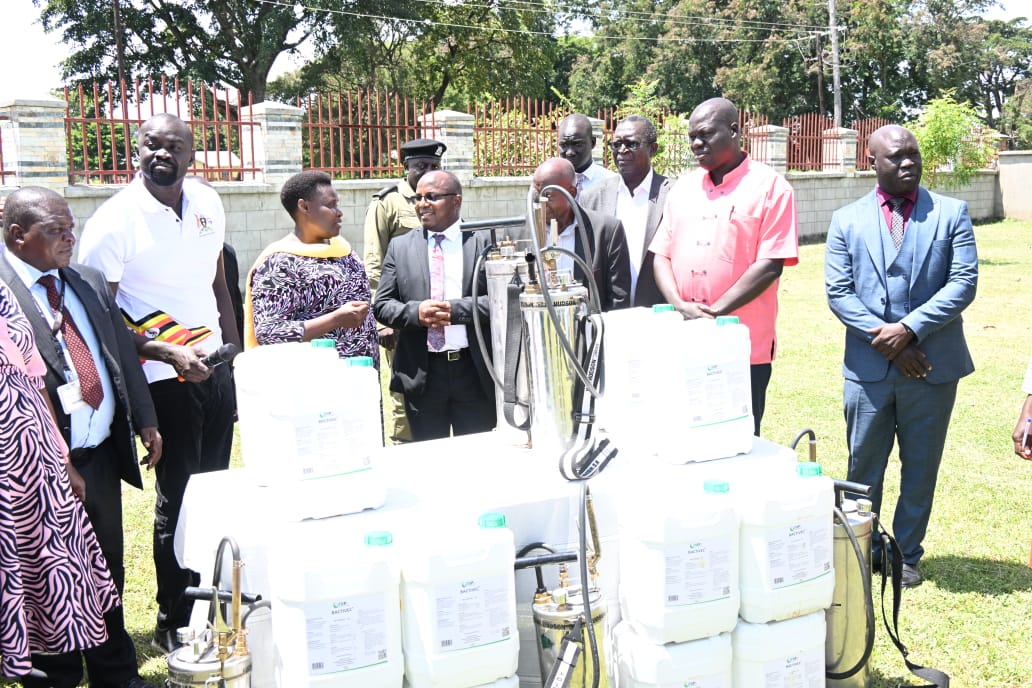
By Emmanuel Okol
In a significant step towards bolstering efforts to eliminate malaria and other vector-borne diseases, Katakwi district local government has received a donation of 1,000 liters of larvicides from the Ministry of Health. The launch was officially handled over today, 11-9-2025, during a ceremonial launch held at the district Headquarters in Katakwi.
Presiding over the event was the Vice President of Uganda, Maj. (Rtd) Jessica Alupo, who said that the consignment was on behalf of the Government of Uganda.
The launch aims to enhance Uganda’s vector control interventions, particularly the control of mosquito breeding sites, to curb the spread of malaria and other mosquito-borne diseases.
In her address, Maj. (Rtd) Jessica Alupo acknowledged the ongoing health challenges faced by the sub-region and Ugandans, highlighting the impact on household incomes, productivity, and overall socio-economic development.
She expressed her appreciation to public health experts for their continued efforts and added that her engagement with technical teams had broadened her understanding of the risks posed by mosquitoes beyond malaria.
The Vice President commended the Ministry of Health for integrating Larval Source Management (LSM), including larviciding, into its national vector control strategy, and emphasized the need to scale up these efforts.
She said the biolarvicide donation in the country follows a meeting between Alupo and the President of Zanzibar, Hussein Ali Mwinyi, at the G77 + China summit in Cuba in 2023.
Alupo lauded the Government of Tanzania for its generous donation and reaffirmed Uganda’s commitment to leveraging innovative approaches in disease prevention and control. She also referenced a historic milestone recently achieved by the country.
Speaking at the same event, Dr. Alfred Mubangizi, Assistant Commissioner (Vector Borne and NTDs) in the Ministry of Health, who represented the Health Minister, underscored the urgent need to intensify efforts against malaria and neglected tropical diseases (NTDs) such as bilharzia, filariasis, onchocerciasis, trachoma, and sleeping sickness, which remain a public health burden in Uganda.
According to Dr. Mubangizi, the biolarvicides will support Uganda’s ongoing larviciding efforts in high-risk districts, where they will be used to target mosquito larvae before they mature and transmit diseases.
He emphasized the importance of innovative approaches to vector control, such as the use of biolarvicides, which target mosquito larvae before they mature and spread disease.
“Controlling mosquito populations will reduce malaria as well as other public health threats.”
However, Hon Bosco Okiror applauds the Ministry of Health for cooperation towards reducing the high risk of malaria deaths in the country.
He urges the community to own the project to ease government work.
Stephen Okure Ilemukorit, the Resident District Commissioner, expressed his deep gratitude for the contribution and highlighted the importance of such partnerships in strengthening the district and region's disease prevention strategies.
The chairman of LCV Katatakwi, Hon Geoffrey Omolo, praised the government’s recent introduction of the malaria biolarvicides, which are now part of the program, and urged people to embrace the government as part of the ongoing efforts to reduce malaria-related deaths.
Meanwhile, Christine Atim, Assistant DHO Katakwi, noted that the Ministry of Health has thanked the ministry for addressing a key component of Uganda’s national malaria control strategy, aiming to end malaria in the country.
She encouraged the health workers to adopt methods and assemble the community on how to address complex malaria breeding sites effectively.
Malaria remains a critical public health challenge for Uganda, with the World Malaria Report 2023 ranking the country as the third-highest contributor to global malaria cases.